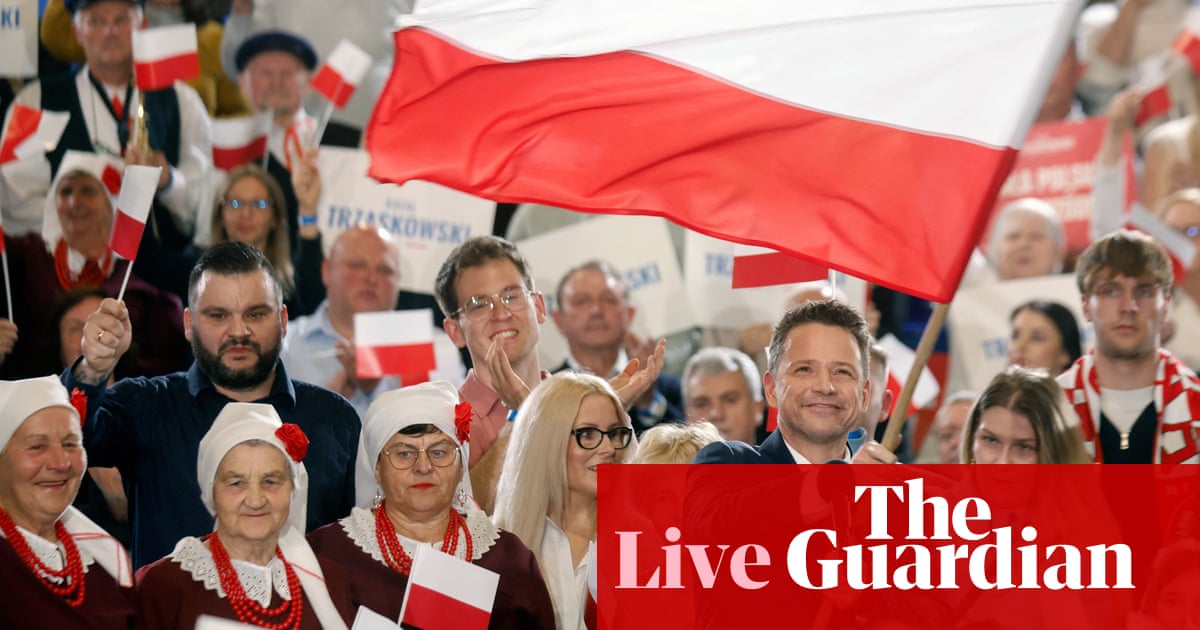Good morning fromPoland, where the top two candidates in last night’s presidential elections – centrist Warsaw mayorRafał Trzaskowskiand radical-right historianKarol Nawrocki– wasted no time this morning before hitting the campaign trail again ahead of the run-off in two weeks’ time.
The final results, published this morning, put Trzaskowski marginally ahead at 31.36%, with Nawrocki at 29.54%.
With both of them now having to broaden their appeal to get to 50%+1 on 1 June, we will inevitably some changing priorities in their campaigns.
There is plenty of votes to be won, but what makes it unusually tricky is that they could come from averydiverse – even diametrically opposed - group of candidates.
Devising an electoral strategy to get votes offSławomir Mentzen,the libertarian anti-establishment candidate, who came third at 14.8% and radical rightGrzegorz Braun(6.34%), while alsosecuring the support of left-of-centre voterswho backedAdrian Zandberg(4.86%) andMagdalena Biejat(4.23%) or centrist supporters ofSzymon Hołownia(4.99%) could prove to be quite a challenge.
As Dr Ben Stanleytold our Super Sunday bloglast night,“candidate electorates are not Lego blocks”as he warned “those who are stacking them to project second round results are overlooking substantial heterogeneity.”
I will also bring you some European reactions to the votes in Romania andPortugal, and all other key updates from across Europe.
It’sMonday, 19 May 2025, it’sJakub Krupahere, and this isEurope Live.
Good morning.
Another big European story today isthe EU-UK summit in London, starting in late morning, which is expected to pave the way for a post-Brexit reset between the two parties, including a new deal on a number of contentious issues.
The talks were taking place over the weekend ahead of a key summit in London hosted byKeir Starmerwith EU leaders on Monday, which is aimed at resetting the UK’s relationship with the bloc five years after Brexit.
My political colleaguesPeter Walker, Jessica ElgotandLisa O’Carrollreport that under the agreement, finalised just a few hours before a crunch summit in London, Brussels is understood to have dropped demands to link the duration of an agreement over food and agricultural goods with fishing rights.
According to EU sources, access to British fishing waters will be granted until the end of June 2038, an extension of 12 years. In return, the agreement on easier checks for food, animal and other agricultural products, known as sanitary and phytosanitary goods (SPS), is indefinite.
One element that is not expected to be finalised on Monday is the shape of any mutual youth mobility scheme, with arguments continuing about the UK’s insistence that the numbers coming in should be capped, which the EU opposes.
My colleagueAndrew Sparrowis running the UK politics blog and will have all the key updates throughout the day here:
So, here are the official results inPolandafter all votes were counted, with the top two candidates in bold going through to the run-off on 1 June.
Rafał Trzaskowski 31.36%Karol Nawrocki 29.54%
Sławomir Mentzen 14.8%Grzegorz Braun 6.34%Szymon Hołownia 4.99%Adrian Zandberg 4.86%Magdalena Biejat 4.23%Krzysztof Stanowski 1.24%Joanna Senyszyn 1.09%Marek Jakubiak 0.77%Artur Bartoszewicz 0.49%Maciej Maciak 0.19%Marek Woch 0.09%
Good morning fromPoland, where the top two candidates in last night’s presidential elections – centrist Warsaw mayorRafał Trzaskowskiand radical-right historianKarol Nawrocki– wasted no time this morning before hitting the campaign trail again ahead of the run-off in two weeks’ time.
The final results, published this morning, put Trzaskowski marginally ahead at 31.36%, with Nawrocki at 29.54%.
With both of them now having to broaden their appeal to get to 50%+1 on 1 June, we will inevitably some changing priorities in their campaigns.
There is plenty of votes to be won, but what makes it unusually tricky is that they could come from averydiverse – even diametrically opposed - group of candidates.
Devising an electoral strategy to get votes offSławomir Mentzen,the libertarian anti-establishment candidate, who came third at 14.8% and radical rightGrzegorz Braun(6.34%), while alsosecuring the support of left-of-centre voterswho backedAdrian Zandberg(4.86%) andMagdalena Biejat(4.23%) or centrist supporters ofSzymon Hołownia(4.99%) could prove to be quite a challenge.
As Dr Ben Stanleytold our Super Sunday bloglast night,“candidate electorates are not Lego blocks”as he warned “those who are stacking them to project second round results are overlooking substantial heterogeneity.”
I will also bring you some European reactions to the votes in Romania andPortugal, and all other key updates from across Europe.
It’sMonday, 19 May 2025, it’sJakub Krupahere, and this isEurope Live.
Good morning.
